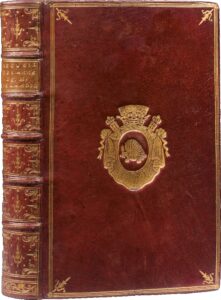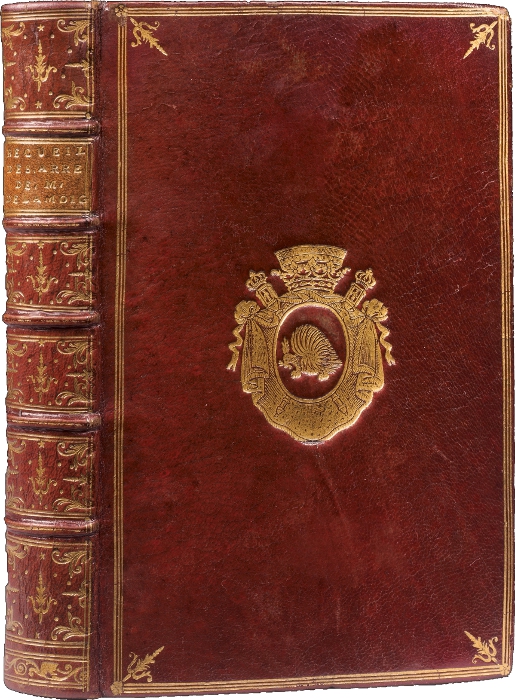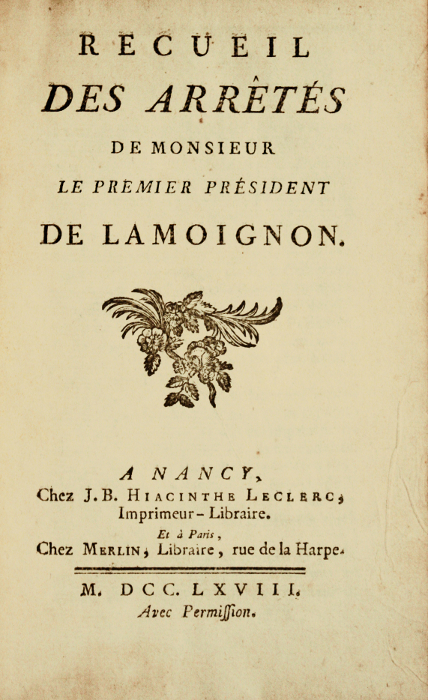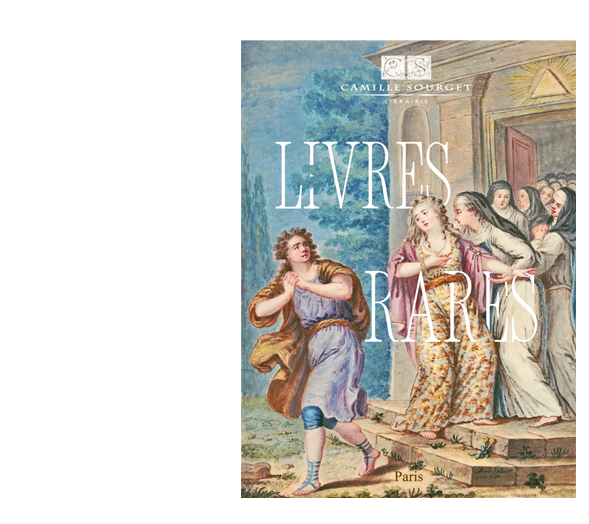Nancy, J.B. Hiacinthe Leclerc and Paris, Merlin, 1768.
8vo [197 x 123 mm.] of (1) bl.l., (4) ll., 432 pp., (1) bl.l. Handwritten corrections in the text. Bound in full contemporary red morocco, triple gilt fillet on covers with gilt fleurons in the corners, arms gilt-stamped in the centre, ribbed spine with gilt fleurons, light brown morocco lettering-piece, inner gilt border, edges gilt. Contemporary binding.
Very rare second edition, corrected and improved, of the ‘Recueil des arrêtés de Monsieur le premier président de Lamoignon’. Quérard, La France littéraire, IV, p. 500 (which mentions the 1702 and 1783 editions, but doesn’t seem to know this specific edition).
An incorrect first edition was printed in 1702 « from the original handwritten by Mr. de Fourcroy, Secretary of these conferences. » This 1702 first edition is full of misprints which garble the substance and the meaning of the matters & the orders. (Avis).
Guillaume de Lamoignon (1617-1677) was the first president of the parliament of Paris and one of the most illustrious members of the ancient French magistrature. He outlines in this compilation a great plan that he had conceived for the reform of the French legislation.
“This Magistrate’s project was to gather under different titles the rules of the French case law, to standardize its decisions by adopting the wiser ones, & to write them in the form of articles to serve as a general law in the kingdom” (Avis).
“The goal of Mr. the First President of Lamoignon was above all to establish in this work the uniformity of the maxims that must lead towards the decision regarding the controversial questions, & to prevent, this way, the contradictions that the decrees of two different Parliaments often show […]. He had always approved heartily the wise politic of one of our Kings, who would have wanted that in France, there would have been only one custom, one standard, & that all the Laws would have been put in French. Mr. the President of Lamoignon has always wanted that we could realize this simple and noble idea. Convinced that this conformity would be as useful to the Public as to the Judges, he conceived the project of this important work ; he gathered together at his place twelve lawyers, to get their feelings about the agreed articles. These articles and the lawyers’ opinions were then examined in Assemblies. They didn’t stop there; they looked for new ways to realize and improve this plan. Messrs Auzanet and Fourcroy, these famous jurisconsults, were responsible for providing Memoirs, & put the matters in order. This work was submitted for review & decision to Mr. the First President of Lamoignon, who concluded and decided the articles himself.” (Gazette des tribunaux, III, 1777, pp. 74-76)
A precious copy bound in contemporary red morocco for the chancellor René-Nicolas-Charles de Maupéou (1714-1792), the great-great grandson of the author of the work.
“The son of René-Charles, the first president of the Parliament of Paris, and of Anne-Victoire of Lamoignon ,he is a counselor at the Parliament of Paris in August 1733, King’s counselor at the State Council and will become principal magistrate of the Parliament in survival of his father on April 1rst 1737 then start practicing on November 12, 1743, then becomes first President of the Parliament on October 12, 1763.He was appointed chancellor and minister of Justice of France on September 16, 1768, after his father quit. He fought heartily the Parliaments during the years 1770-1775. He exiled the Parliament of Paris which pretended to control the King’s power in 1771 and replaced it with a new Parliament assisted by six superior councils, despite the protest of the other parliaments, the courts of Justice and the public opinion; he reformed at the same time the way to apply justice, and abolished the venality of the charges; after struggling during several months, in the end he won against the opposition of the Parliaments, but Louis XV’s death ruined his work and his fortune. Louis XVI took the ministry of Justice away from him and put back the former Parliaments. Maupéou was the last chancellor of France.” (Olivier, Pl. 2243). The mother of the chancellor René-Nicolas-Charles de Maupéou (1714-1792), who had this volume bound with his arms, was in reality the great granddaughter of Guillaume of Lamoignon, the author of this compilation of articles.
Provenance : René Nicolas Charles de Maupéou and Docteur L. Ribadeau Dumas with ex libris.
Location of only four copies: Libraries of Metz, Caen, Nancy and B.n.F.



